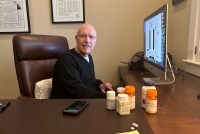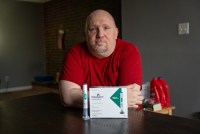Latest KFF Health News Stories
Journalists Examine Medicaid Unwinding, Farmworkers’ Mental Health, and the Big Opioid Payback
KFF Health News and California Healthline staff made the rounds on national and local media this week to discuss their stories. Here’s a collection of their appearances.
Readers Call on Congress to Bolster Medicare and Fix Loopholes in Health Policy
KFF Health News gives readers a chance to comment on a recent batch of stories.
Hacking at UnitedHealth Unit Cripples a Swath of the US Health System: What to Know
Change Healthcare, a firm recently bought by insurance giant UnitedHealth Group, reportedly suffered a cyberattack. The company processes 14 billion transactions annually, including payments and requests for insurance authorizations.
Si eres pobre, un tratamiento de fertilidad suele ser un sueño inaccesible
Pero las personas con ingresos más bajos, a menudo de minorías, tienen más probabilidades de estar cubiertas por Medicaid o por seguros limitados que no tienen esta cobertura.
Say That Again: Using Hearing Aids Can Be Frustrating for Older Adults, but Necessary
Hearing loss is more than a nuisance. It also raises the risk of cognitive decline, dementia, falls, depression, and social isolation.
Without Medicare Part B’s Shield, Patient’s Family Owes $81,000 for a Single Air-Ambulance Flight
Sky-high bills from air-ambulance providers have sparked complaints and federal action in recent years. But a rural Tennessee resident fell through the cracks of billing protections — and a single helicopter ride could cost much of her estate’s value.
If You’re Poor, Fertility Treatment Can Be Out of Reach
For low-income people who are on Medicaid or whose employer health plan is skimpy, help for infertility seems unattainable.
Opposition to Medicaid Expansion Thaws in an Unexpected Place: The Deep South
For more than a decade, some Southern states have resisted Medicaid expansion under the Affordable Care Act, even though data suggest it could help their residents. Today, the large majority of uninsured Americans who would gain coverage under Medicaid expansion — and who would benefit from affordable access to care — live in non-expansion states […]
In California, Faceoff Between Major Insurer and Health System Shows Hazards of Consolidation
Even as Anthem Blue Cross and University of California Health announced a contract agreement this month, analysts say patients are increasingly at risk of being affected by such disputes.
Patients See First Savings From Biden’s Drug Price Push, as Pharma Lines Up Its Lawyers
A restructuring of the Medicare drug benefit has wiped out big drug bills for people who need expensive medicines. But the legal battle over drug negotiations means uncertainty over long-term savings.
Southern Lawmakers Rethink Long-Standing Opposition to Medicaid Expansion
While many Republican state lawmakers remain firmly against Medicaid expansion, some key leaders in holdout states are showing a willingness to reconsider. Public opinion, financial incentives, and widening health care needs make resistance harder.
States Get in on the Prior Authorization Crackdown
Last month, my colleague Lauren Sausser told you about the Biden administration’s crackdown on insurance plans’ prior authorization policies, with new rules for certain health plans participating in federal programs such as Medicare Advantage or the Affordable Care Act marketplace. States are getting in on the action, too. Prior authorization, sometimes called pre-certification, requires patients […]
The No Surprises Act Comes With Some Surprises
The No Surprises Act, the landmark law intended to protect patients from surprise out-of-network medical bills, has come with, well, some surprises. A little more than two years after it took effect, there’s good and bad news about how it’s working. First, it’s important to note that the law has successfully protected millions of patients […]
For the Love of Health Care and Health Policy
KFF Health News shares the crème de la crème of reader-submitted health policy valentines. Two of our favorites melted our hearts and inspired original illustrations.
In Fight Over Medicare Payments, the Hospital Lobby Shows Its Strength
Medicare pays hospitals about double what it pays other providers for the same services. The hospital lobby is fighting hard to make sure a switch to “site-neutral payments” doesn’t become law.
¿Ofrecer vivienda gratis es atención médica? Programas de Medicaid dicen que sí
Estados están invirtiendo miles de millones de dólares en un experimento de atención médica de alto riesgo: utilizar fondos ya escasos de seguros de salud públicos para proporcionar vivienda a los estadounidenses más pobres y enfermos.
States Target Health Insurers’ ‘Prior Authorization’ Red Tape
Doctors, patients, and hospitals have railed for years about the prior authorization processes that health insurers use to decide whether they’ll pay for patients’ drugs or medical procedures. The Biden administration announced a crackdown in January, but some state lawmakers are looking to go further.
Cerca de 10 millones ya perdieron Medicaid, y todavía faltan meses de purga
Medicaid y el Programa de Seguro de Salud Infantil crecieron hasta alcanzar un récord de 94 millones de inscritos durante la pandemia.
Halfway Through ‘Unwinding,’ Medicaid Enrollment Is Down About 10 Million
While more Medicaid beneficiaries have been purged in the span of a year than ever before, enrollment is on track to settle at pre-pandemic levels.
Halfway Through ‘Unwinding,’ Medicaid Enrollment Is Down About 10 Million
We’re halfway through the Medicaid “unwinding,” in which states are dropping people from the government health insurance program for the first time since the pandemic began. Millions of people have been dumped from the rolls since April, often for procedural issues like failing to respond to notices or return paperwork. But at the same time, […]





















